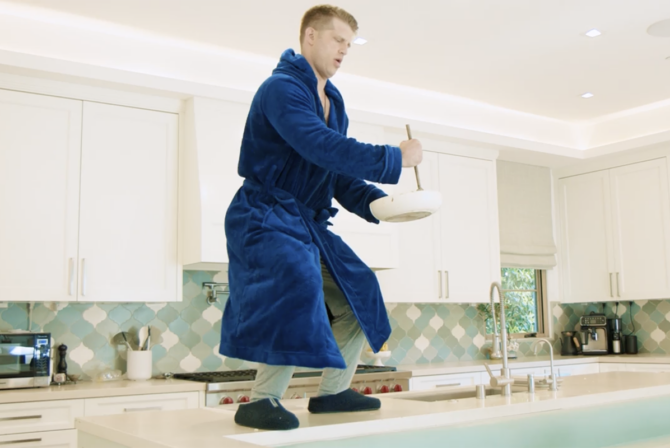Back in May, I interviewed Cory Silverberg, a sexuality educator and author of What Makes a Baby, a picture book “about where babies come from.” Below, Cory has taken the time to answer some more questions, this time from Kveller parents and readers.
“How do you talk to your 3-year-old about where and when it’s ok to touch her vagina? And what’s the best way to explain why she can’t just touch it all day long?”
This is a great question! I know that we all have different relationships with our bodies but I hope most of us can appreciate that it’s perfectly reasonable for a 3-year-old to not only want to touch her vagina, but to do so all day. It’s not tenable, of course, but I think starting from a place of understanding instead of outrage or embarrassment goes a long way.
You may be feeling stuck because you are imagining one conversation to deal with this. But this needs much more than one conversation. You need to share with your 3-year-old your ideas about privacy, about bodies and touch, and about pleasure. I can’t tell you what to say because I’m not sure how you feel about any of these things, but I’ll offer you an example of how some parents I know talk about it.
Most children touch themselves because it feels good. Some touch their genitals, some play with their ears or feet or belly buttons. It’s worth remembering that most young children haven’t yet learned to feel embarrassed and ashamed of some parts of their bodies while being focused and anxious on others. As adults we care about our faces and abs and butts, and talk about doing things to make them look a certain way, but we never talk about our genitals. Until children learn otherwise, their bodies are whole things, not component parts.
Children learn a lot by how we as grown ups respond to things they do. When they put their hands down their pants and we snap “Don’t do that!” or even “Don’t do that here!” a lesson is learned. Especially if we don’t come back and talk about our response and why we had it.
For parents who want to raise their children both with a sense that their bodies are theirs, and that pleasure in the body is a good thing, here’s one approach.
You might start by saying that touching her own vagina is fine, and in fact it can feel quite nice, but it’s something she can do when she’s alone (in her room, in the bathroom). It’s also a good time to point out that some parts of our body we should only touch when our hands are clean (like inside our mouths, our eyes, and our vaginas).
Explaining that just like we have an inside voice and an outside voice (or make reference to whatever you child already knows about the difference between public and private) the places we touch ourselves are different if we’re alone in our room or in the bathroom and when we’re in public.
At 3 I’m not sure I’d do a lot more explaining, but I would certainly ask if she has questions.
“My 4-year-old daughter keeps asking how to make a baby. My standard is ‘When your belly is big enough to hold a baby, you will know how to make one.’ I know there are many problems associated with this response, not the least of which is the idea that one carries a baby in one’s belly. What should I say instead?”
I’ll start by asking you two questions: what would you like your daughter to know by the time she is of an age where she could (potentially) have a child, and what do you want her to know now, at age 4? When it comes to reproduction, sexuality, and gender, all of which are pretty abstract and complicated concepts to understand, you have to know that at age 4 your answers are much more about building a foundation as they are about answering the mechanics.
Having said that, my number one tip is start by taking a pause just so you don’t feel flustered, and then think of a question to ask in response to make sure you know what is being asked. How do you make a baby might be a question about biology, it might be a question about bodies, it might be a question about families, or religion. You don’t know for sure what your daughter is asking because chances are she doesn’t have a sense of the scope of the question.
If she is asking what you NEED to make a baby, then at the age of 4 I would probably explain that some bodies have eggs, some bodies have sperm, and some bodies have a uterus, and you need all three to make a baby. Sometimes people do this on their own, sometimes with help.
She might be asking WHY you’d want to make a baby. The answer to this question depends on you. Maybe it’s about family. Maybe it’s about love. Maybe it’s a story about your own childhood.
She might be asking WHO can make a baby. At her age I’d leave it very open. I’d say lots of different people can make babies. But you can’t make a baby until your body goes through some changes that happen when you’re a bit older (you want to leave this open since kids go through puberty at very different ages). Then you can let her know that as she gets older you’re going to be happy to talk more about this.
 “Both of my girls were conceived via IVF. When and how do you recommend that I tell them about it?”
“Both of my girls were conceived via IVF. When and how do you recommend that I tell them about it?”
There are different opinions about this and I think it’s important that you consider them all and decide what’s right for you and your family. In the past the advice of professionals (well primarily doctors) was that there’s no reason to share this information. Today, most of the fertility counselors and allied professionals that I know and work with agree, make this part of their birth story and tell them early and often.
By early I mean as soon as you start telling them stories about when they were born. Some families love to share these stories and think of it as a part of helping their kids know who they are. In other families the birth story is rarely shared. If you’re the kind of family that shares stories than you can start today.
How you tell the story is a different, well, story. I don’t know your daughters ages, but to give you a sense of how I talk about this with very young children, I say that sometimes when grown ups want to make a baby their bodies don’t cooperate. But there are people whose job it is (some are doctors, some are nurses, some are called counselors) to help. So some babies are born because a lot of people helped!
The story gets more involved if there was egg and/or sperm donation. And if the donors were known or unknown. For older children I would start with the basics and then ask if they have more questions. I would certainly explain, in simple language, the process of IVF, making sure to not only talk about the science of it, but to give equal weight to the emotions.
For whatever reason, in our society we tend to give more credit to people who make a baby by having intercourse, as if that’s the “right” way. It’s actually the easiest way, so I’m not sure why we don’t celebrate the rest of us, who went through a lot more to get it done! As you may have experienced, IVF comes with a lot of emotions, and while I wouldn’t focus on the negative ones alone, I think it’s nice for children to know how much they were wanted.
“How do you tell your child it’s not appropriate to hump random objects at friends’ houses?”
I’m of two minds with behavior like this. Part of me wants to ask why we treat this differently than any other behavior that’s deemed socially inappropriate (yelling loudly indoors, picking your nose, farting, etc…) This part of me would say deal with the humping however you deal with the nose picking.
But there’s another part of me that acknowledges that behaviors in kids that as adults we see as sexual do trigger different responses.
It’s important to remember though that when a 4-year-old is humping a teddy bear or couch or leg, it’s not the same thing as adult sexuality. Kids haven’t developed an understanding of what it means to act sexually in public, they haven’t been sexually socialized yet, and so when they do this stuff, it doesn’t come with the same baggage for them that it does for us. And it doesn’t even mean the same thing to them.
In fact they may rightly be puzzled at why you have a problem with them doing something that feels good. You tell them all the time you love them, that they are precious, and deserving of wonderful things. And then you turn around and put a stop to something that makes them feel real good. And, for some kids, it’s also something that gets them a lot of attention.
Even so, I’m with you on putting a stop to the humping. I would start by trying to minimize the amount of embarrassment or shame you project onto your kid in the process. So rather than get angry or turn red or make a big deal at the friend’s house, I’d ask them to stop (and then when they don’t I’d tell them to stop) and say that I promise to talk more about it later.
When later comes I think the conversation you have needs to match your values about sexuality, pleasure, and the divide between public and private. Much of my response to the question about the 3-year-old who wants to play with her vagina all day applies here.
The truth is that we all make compromises when we’re in public. Maybe humping your bed or your own teddy bear in the privacy of your own room is fine. But in the end it’s something that can make other people feel uncomfortable and so even though there’s nothing wrong with the feelings and the desire, it’s about time and place. I’d want to check in to make sure they understand, and also check in a few days later to know what they think of this whole business of compromise. This is a good example of how sometimes what seems like a lesson about sexuality is also a lesson about life.
Like this post? Get the best of Kveller delivered straight to your inbox.







